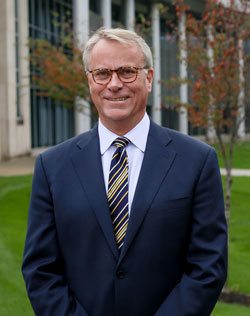Blog
What Does it Mean to Be a Transformational Leader?
By Daniel J. Elsener | November 20, 2019

Marian University was founded on the transformational leadership of the Sisters of Saint Francis of Oldenburg, specifically Mother Clarissa Dillhoff. Upon purchasing the Allison Estate, she wrote to her community, “It is this very spirit united effort to keep our schools in the lime light of educational endeavor: to do the best that can be done—which has induced us to undertake what may seem a preposterous project at this particular time; namely, the opening of a Day College in Indianapolis. This new adventure has been thrust upon us with a speed never-before experienced…and…it is worth the venture” (Whalen, 1966).
Even though some may see it as a preposterous journey, we are continuing her vision of building a great Catholic university in this great American city today. As we continue to educate transformational leaders who are so needed in our world today, leaders who will serve in healthcare, education, business, and in the Church and other not-for-profit organizations, we must constantly ask one most important question: What does it mean to be a transformational leader?
Throughout my many years of service in education, I have come to recognize the most important and necessary characteristics that make up exemplary transformational leaders. First and foremost, transformational leaders strive to utilize inquisitive, thoughtful, knowledgeable, and creative approaches to problem-solving in the pursuit of opportunities that improve and advance the human condition. Secondly, transformational leaders possess exceptional skills in written and oral communication, cultural awareness, competency, and relationship building. Moreover, they have a high degree of proficiency in their specific professional responsibilities (e.g. teaching, accounting, medicine, etc.). Furthermore, transformational leaders are rooted in their outstanding character and trustworthiness in all aspects of their professional work and daily life. Finally, transformational leaders are responsible stewards of themselves, meaning that they nurture their bodies, minds, and spirits to better use their gifts in service to the world. It is clear that where there are these attributes of leadership, human flourishing advances.
When I look in the rear view mirror of Marian University, I see the Sisters of Saint Francis providing bold leadership, as well as women and men—educated in the Franciscan and Liberal Arts tradition—making profound impacts on society in education, healthcare, pastoral ministry, and the sciences. This legacy of transformational leadership calls everyone in the Marian community and beyond to invest a very generous effort in advancing the intellect, skills, character, and good stewardship of our gifts, so that we all further our ability to be transformational leaders.
Simply stated, Marian’s commitment to transformational leadership extends well beyond the campus and into the larger community, city, state, nation, and world, because transformational leadership is contagious by nature. When someone witnesses one of our wonderful students, faculty, staff, board members, donors, or alumni providing incredible service in any given field and living out the Franciscan values on which Marian was built, they are inspired to strive for those same transformational qualities in themselves. Thus, the ultimate goal and purpose of being a transformational leader is to encourage others to do the same, to continue the legacy that the Sisters began over 80 years ago. To be a truly transformational leader is to strive to improve the world and continue to educate others to become transformational leaders themselves.
© 2021 Marian University
Notice of Nondiscrimination
Marian University does not discriminate on the basis of race, ethnicity, color, sex, gender, gender identity, sexual orientation, religion, creed, national origin, age or disabilities in the selection
of administrative personnel, faculty and staff, and students.
*Placement rates are gathered from data collected from graduates within six months of graduation.
Students may make a complaint to the Indiana Commission of Higher Education.
Marian University is sponsored by the Sisters of St. Francis, Oldenburg, Indiana.
Submit a Marketing Request
Website built with